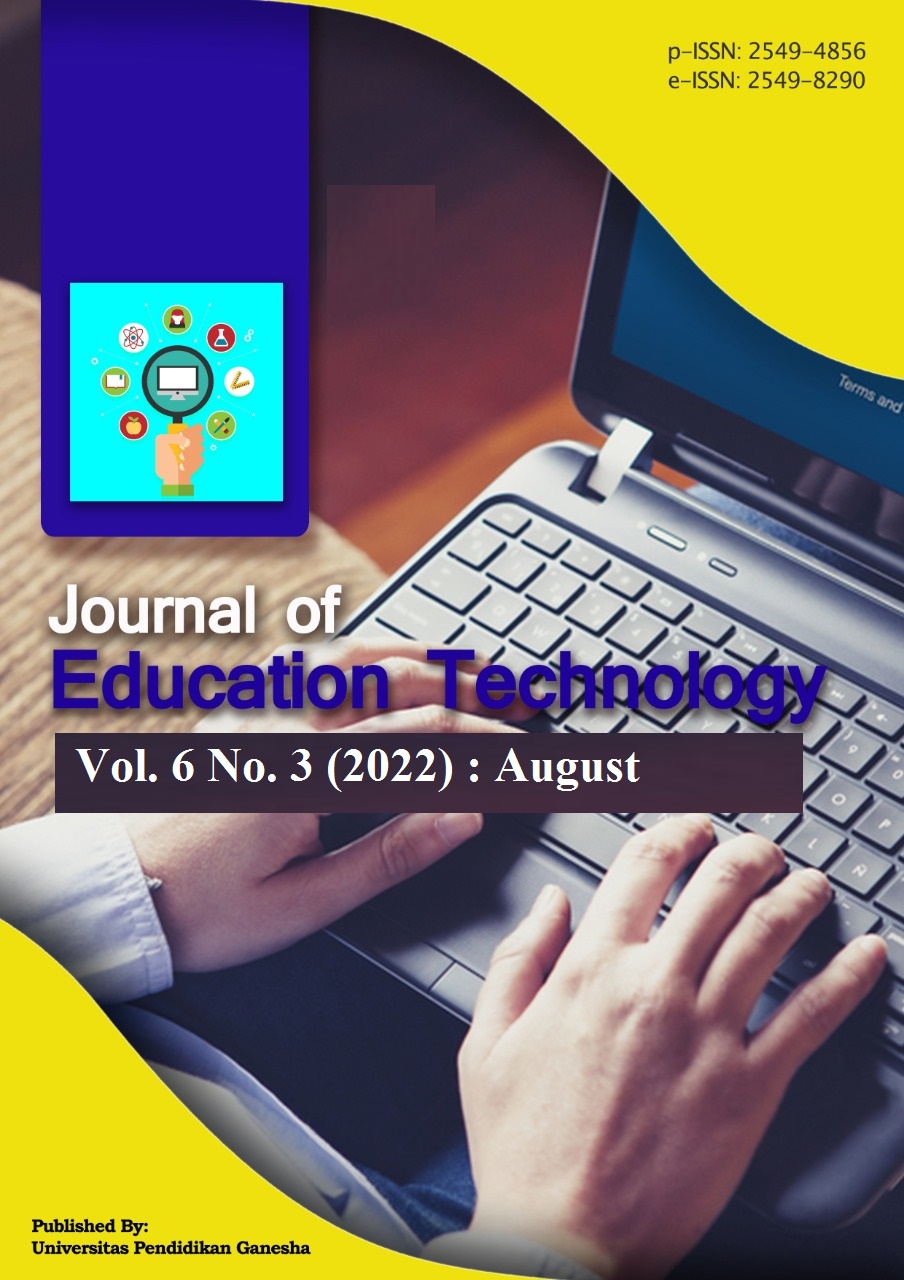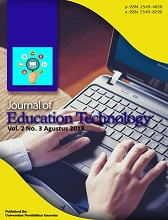Enhancing Students’ Reading Comprehension with Gamification of Local Wisdom Stories during Emergency Online Learning
DOI:
https://doi.org/10.23887/jet.v6i3.47289Keywords:
Gamification, Reading Comprehension, StudentsAbstract
During online learning time, students are required to learn more independently. However, the absence of learning media to support learning process makes it difficult for students to understand the learning material. This current study was aimed at analyses the impact of gamification of local wisdom stories towards students’ reading comprehension during emergency remote teaching. The study was an experimental study with pretest posttest design followed by 127 students in two selected primary schools. In conducting the study, students were given pretest about their reading comprehension, introduced and taught with gamification of local wisdom stories, and given posttest after finishing the material available in gamification. The instruments used have been through expert tests and field tests. Descriptive analysis was conducted to find the mean score and standard deviation. From the results of descriptive and inferential analysis, it was found that the mean score students’ reading comprehension in posttest (80.27) was higher than the pretest (72.91). A significant mean difference was identified based on the result of paired sample t test (Sig. 2-tailed= .001). The study concludes that the use of gamification of local wisdom stories was able to enhance students’ reading comprehension. Suggestions for further study are also encouraged in order to enhance the quality of gamification and students’ learning satisfaction.
References
Abusa’aleek, R. A., & Baniabdelrahman, A. A. (2020). The Effect of Gamification on Jordanian EFL Sixth Grade Students’ Reading Comprehension. International Journal of Education and Training (InjET), 6(1), 1–11. https://www.researchgate.net/profile/Abdallah-Baniabdelrahman-2/publication/343255275_The_Effect_of_Gamification_on_Jordanian_EFL_Sixth_Grade_Students’_Reading_Comprehension/links/5f20079545851515ef504d0c/The-Effect-of-Gamification-on-Jordanian-EFL-Sixth-Grade-Students-Reading-Comprehension.pdf.
Almeida, F., & Simoes, J. (2019). The Role of Serious Games , Gamification and Industry 4 . 0 Tools in the Education 4 . 0 Paradigm. Contemporary Educational Technology, 10(2), 120–136. https://doi.org/10.30935/cet.554469.
Andarwulan, T., Al Fajri, T. A., & Damayanti, G. (2021). Elementary teachers’ readiness toward the online learning policy in the new normal era during Covid-19. International Journal of Instruction, 14(3), 771–786. https://doi.org/10.29333/iji.2021.14345a.
Browne, K., Anand, C., & Gosse, E. (2014). Gamification and serious game approaches for adult literacy tablet software. Entertainment Computing, 5(3), 135–146. https://doi.org/10.1016/j.entcom.2014.04.003.
Buck, M. F. (2017). Gamification of Learning and Teaching in Schools – A Critical Stance. Seminar.Net, 13(1). https://doi.org/10.7577/seminar.2325.
Buckley, P., & Doyle, E. (2016). Gamification and student motivation. Interactive Learning Environments, 24(6), 1162–1175. https://doi.org/10.1080/10494820.2014.964263.
Castillo-Cuesta, L. (2022). Using Genially Games for Enhancing EFL Reading and Writing Skills in Online Education. International Journal of Learning, Teaching and Educational Research, 21(1), 340–354. https://doi.org/10.26803/ijlter.21.1.19.
Choate, K., Goldhaber, D., & Theobald, R. (2021). The effects of COVID-19 on teacher preparation. Phi Delta Kappan, 102(7), 52–57. https://doi.org/10.1177/00317217211007340.
Choi, J., & Yi, Y. (2016). Teachers’ Integration of Multimodality Into Classroom Practices for English Language Learners. TESOL Journal, 7(2), 304–327. https://doi.org/10.1002/tesj.204.
Chung, C. H., Shen, C., & Qiu, Y. Z. (2019). Students’ acceptance of gamification in higher education. International Journal of Game-Based Learning, 9(2), 1–19. https://doi.org/10.4018/IJGBL.2019040101.
Dewi, N. K. S. (2021). EFL Pre-Service Teachers’ Perception of Their Readiness in Teaching Online during Covid-19 Pandemic. The Art of Teaching English as a Foreign Language, 2(2), 163–168. https://doi.org/10.36663/tatefl.v2i1.172.
Elshami, W., Taha, M. H., Abuzaid, M., Saravanan, C., Al Kawas, S., & Abdalla, M. E. (2021). Satisfaction with online learning in the new normal: perspective of students and faculty at medical and health sciences colleges. Medical Education Online, 26(1). https://doi.org/10.1080/10872981.2021.1920090.
Englund, C., Olofsson, A. D., & Price, L. (2017). Teaching with technology in higher education: understanding conceptual change and development in practice. Higher Education Research and Development, 36(1), 73–87. https://doi.org/10.1080/07294360.2016.1171300.
Espino-Díaz, L., Fernandez-Caminero, G., Hernandez-Lloret, C. M., Gonzalez-Gonzalez, H., & Alvarez-Castillo, J. L. (2020). Analyzing the impact of COVID-19 on education professionals. Toward a paradigm shift: ICT and neuroeducation as a binomial of action. Sustainability (Switzerland), 12(14), 1–10. https://doi.org/10.3390/su12145646.
Handoko, W., Mizkat, E., Nasution, A., Hambali, & Eska, J. (2021). Gamification in Learning using Quizizz Application as Assessment Tools. Journal of Physics: Conference Series, 1783(1). https://doi.org/10.1088/1742-6596/1783/1/012111.
Hill, J. B. (2021). Pre-Service Teacher Experiences during COVID 19: Exploring the Uncertainties between Clinical Practice and Distance Learning. Journal of Practical Studies in Education, 2(2), 1–13. https://doi.org/10.46809/jpse.v2i2.18.
Huwaidi, F., Bayu, A., Nandiyanto, D., & Muhammad, N. (2021). Indonesian Journal of Educational Research and Technology The Urgency of Online Learning Media during the Covid- 19 Pandemic at the Vocational School in Indonesia. Indonesian Journal of Educational Research and Technology, 1(2), 35–40. https://doi.org/10.17509/ijert.v1i2.33368.
Islam, M. K., Sarker, M. F. H., & Islam, M. S. (2022). Promoting student-centred blended learning in higher education: A model. E-Learning and Digital Media, 19(1), 36–54. https://doi.org/10.1177/20427530211027721.
Jamal, S. (2020). Analisis Kesiapan Pembelajaran E-Learning Saat Pandemi Covid-19 Di Smk Negeri 1 Tambelangan. Jurnal Nalar Pendidikan, 8(1), 16. https://doi.org/10.26858/jnp.v8i1.13561.
John W Creswell. (2014). Research Design, Qualitatives, Quantitative, and Mixed Methods Approcahes (Fourth Edition). Sage Publications.
Karuniasih, N. L. A. G. (2022). Exploring Readiness of Teachers Toward English Remote Teaching. Journal of Educational Study, 1(3), 134–149. https://doi.org/10.36663/joes.v1i3.204.
Kaufmann, D. (2018). Reflection: Benefits of Gamification in Online Higher Education. Journal of Instructional Research, 7(1), 125–132. https://doi.org/10.9743/jir.2018.12.
Khaitova, N. F. (2021). History of Gamification and Its Role in the Educational Process. International Journal of Multicultural and Multireligious Understanding, 8(5), 212. https://doi.org/10.18415/ijmmu.v8i5.2640.
Khaldi, K. (2017). Quantitative, qualitative or mixed research: which research paradigm to use? Journal of Educational and Social Research, 7(2), 15–15. https://doi.org/10.5901/jesr.2017.v7n2p15.
Laura, K., Franco, L., & Luza, K. (2020). Gamification for understanding english texts for students in a public school in Peru. International Journal of Development Research, 10(10), 41787–41791. https://doi.org/https://doi.org/10.37118/ijdr.20319.10.2020.
Li, X., & Chu, S. K. W. (2021). Exploring the effects of gamification pedagogy on children’s reading: A mixed-method study on academic performance, reading-related mentality and behaviors, and sustainability. British Journal of Educational Technology, 52(1), 160–178. https://doi.org/10.1111/bjet.13057.
Mee Mee, R. W., Shahdan, T. S. T., Ismail, M. R., Abd Ghani, K., Pek, L. S., Von, W. Y., Woo, A., & Rao, Y. S. (2020). Role of gamification in classroom teaching: Pre-service teachers’ view. International Journal of Evaluation and Research in Education, 9(3), 684–690. https://doi.org/10.11591/ijere.v9i3.20622.
Mohamad, M., Arif, F. K. M., Alias, B. S., & Yunus, M. M. (2020). Online game-based formative assessment: Distant learners post graduate students’ challenges towards quizizz. International Journal of Scientific and Technology Research, 9(4), 994–1000. https://www.researchgate.net/profile/Monaim-Mohamad-2/publication/348201276_Online_game-based_formative_assessment_Distant_learners_post_graduate_students’_challenges_towards_quizizz/links/60c30050299bf1949f499c4a/Online-game-based-formative-assessment-Di.
Mukhtar, K., Javed, K., Arooj, M., & Sethi, A. (2020). Advantages, Limitations and Recommendations for online learning during COVID-19 pandemic era. Pakistan Journal of Medical Sciences, 36((COVID19-S4)), S27. https://doi.org/10.12669/pjms.36.COVID19-S4.2785.
Nieto-Escamez, F. A., & Roldán-Tapia, M. D. (2021). Gamification as Online Teaching Strategy During COVID-19: A Mini-Review. Frontiers in Psychology, 12(May), 1–9. https://doi.org/10.3389/fpsyg.2021.648552.
Pallant, J. (2016). SPSS Survival Manual: A Step by Step Guide to Data Analysis Using IBM SPSS. Open University Press.
Rahiem, M. D. H. (2020). The emergency remote learning experience of university students in Indonesia amidst the COVID-19 crisis. International Journal of Learning, Teaching and Educational Research, 19(6), 1–26. https://doi.org/10.26803/ijlter.19.6.1.
Rahmani, E. F. (2020). The Benefits of Gamification in the English Learning Context. IJEE (Indonesian Journal of English Education), 7(1), 32–47. https://doi.org/10.15408/ijee.v7i1.17054.
Rajendran, T. A., & Shah, P. M. (2020). Students perception on Gamification: The use of Kahoot. International Journal of Scientific and Research Publications (IJSRP), 10(05), 773–783. https://doi.org/10.29322/ijsrp.10.05.2020.p10190.
Schultz, R. B., & DeMers, M. N. (2020). Transitioning from Emergency Remote Learning to Deep Online Learning Experiences in Geography Education. Journal of Geography, 119(5), 142–146. https://doi.org/10.1080/00221341.2020.1813791.
Shi, L., & Cristea, A. I. (2016). Motivational gamification strategies rooted in self-determination theory for social adaptive e-learning. International Conference on Intelligent Tutoring Systems, 294–300. https://doi.org/10.1007/978-3-319-39583-8_32.
Taber, K. S. (2018). The Use of Cronbach’s Alpha When Developing and Reporting Research Instruments in Science Education. Research in Science Education, 48(6), 1273–1296. https://doi.org/10.1007/s11165-016-9602-2.
Urh, M., Vukovic, G., Jereb, E., & Pintar, R. (2015). The Model for Introduction of Gamification into E-learning in Higher Education. Procedia - Social and Behavioral Sciences, 197, 388–397. https://doi.org/https://doi.org/10.1016/j.sbspro.2015.07.154.
Yu, H., Liu, P., Huang, X., & Cao, Y. (2021). Teacher Online Informal Learning as a Means to Innovative Teaching During Home Quarantine in the COVID-19 Pandemic. Frontiers in Psychology, 12(June), 1–12. https://doi.org/10.3389/fpsyg.2021.596582.
Downloads
Published
How to Cite
Issue
Section
License
Copyright (c) 2022 Putu Kerti Nitiasih, I Gede Yoga Permana, Luh Gd Rahayu Budiartha

This work is licensed under a Creative Commons Attribution-ShareAlike 4.0 International License.
Authors who publish with the Journal of Education Technology agree to the following terms:
- Authors retain copyright and grant the journal the right of first publication with the work simultaneously licensed under a Creative Commons Attribution License (CC BY-SA 4.0) that allows others to share the work with an acknowledgment of the work's authorship and initial publication in this journal.
- Authors are able to enter into separate, additional contractual arrangements for the non-exclusive distribution of the journal's published version of the work (e.g., post it to an institutional repository or publish it in a book), with an acknowledgment of its initial publication in this journal.
- Authors are permitted and encouraged to post their work online (e.g., in institutional repositories or on their website) prior to and during the submission process, as it can lead to productive exchanges, as well as earlier and greater citation of published work. (See The Effect of Open Access)


















